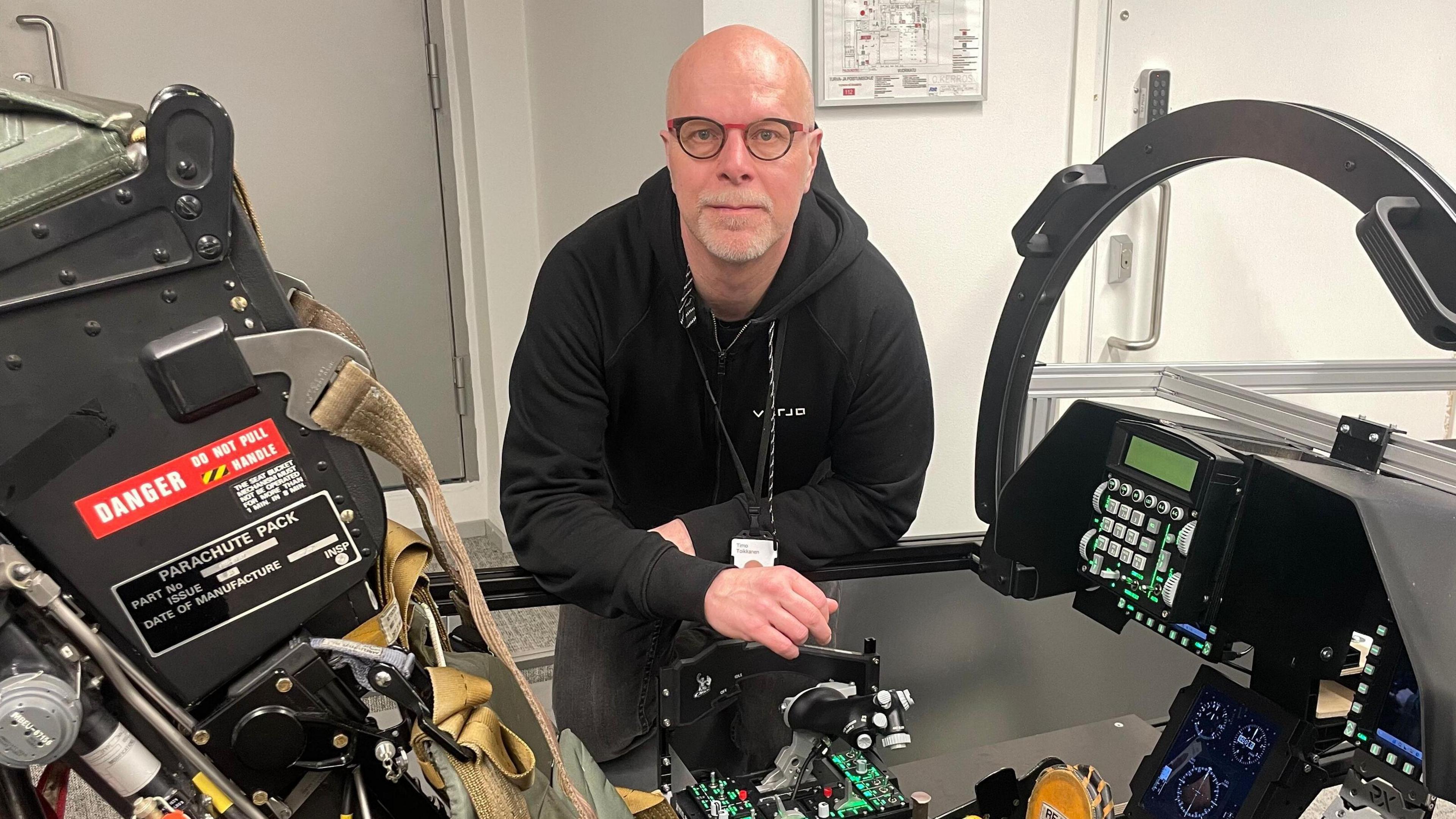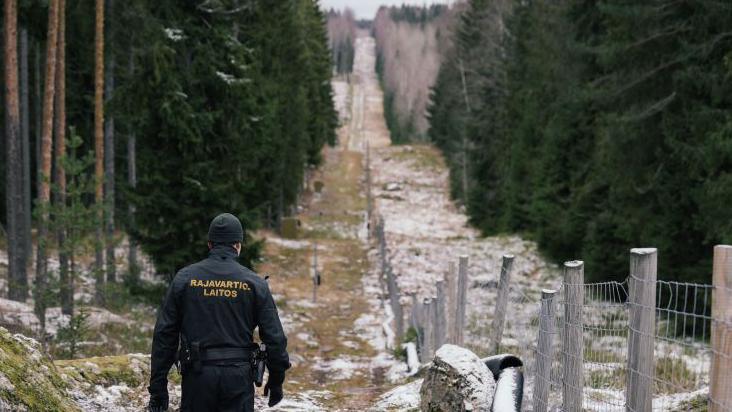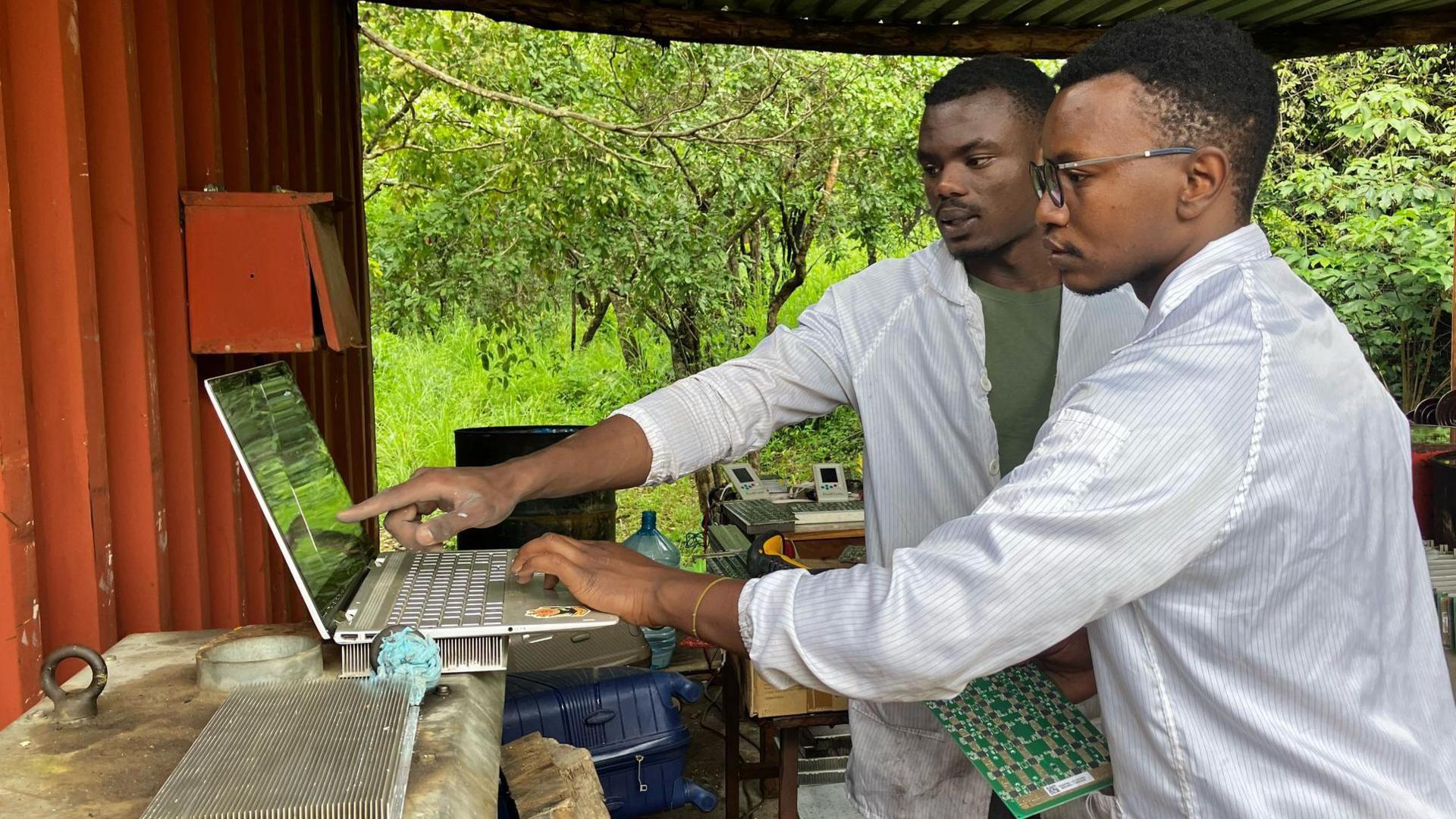The Finnish defence firms 'on steroids'

Jose Barrientos builds headsets for military training
- Published
Wearing a laboratory coat and thin silver gloves, production specialist Jose Barrientos is painstakingly piecing together a white-framed goggle-like headset.
It includes multiple cameras, eye-tracking technologies and electronics that work together to simulate scenarios from high stakes military operations.
"Everything has to be perfect," says the production specialist. "So many different things can affect other things that can affect the final product in such a massive, massive way."
Mr Barrientos works for Varjo, one of a growing number of companies in Finland developing innovations that can assist military forces and governments in preparing for or reacting to conflict.
The Nordic nation, with a population of just five million, has 368 defence tech companies, according to research for Tesi, a state-funded venture capital company, released last September, external.
Around 40% of these are start-ups and scale-ups, with many growing at rates of 30% to 40% if their tools are dual-use technologies that can also be used in other industries.
Helsinki is now among the top five cities in Europe for defence, security and resilience investments, according to a separate report, external released in February by tech data platform Dealroom, in collaboration with the Nato Innovation Fund, an independent venture capital fund launched in 2023 with funding from 24 Nato allies.
Varjo says its headsets are being used to provide 80 simulation programmes to Nato forces in the US and Europe.
In simple terms, its products are more advanced versions of the virtual reality headsets used in gaming.
But they combine synthetic artificial content with views of real-world environments.
This "mixed reality" experience "squeezes the training continuum" for fighter pilots, says the firm's CEO Timo Toikkanen, because they no longer have to travel long distances to complete war simulations in giant aircraft hangers, which are expensive to power and run. "You can do 99% of the same [training] inside of the headset."
The start-up had already attracted heavy investment prior to Russia's invasion of Ukraine, and started working with medical research companies and car manufacturers.
But Mr Toikkanen says the start of the conflict and Finland's admission to Nato a year later "just kind of put everything on steroids" in terms of interest in its defence offering.
Since March 2022 the company has raised more than €50m (£42m; $54m) in additional funding.

War in Ukraine has put Timo Toikkanen's defence firm "on steroids"
Mr Toikkanen says that before the war technologies that could be used by military forces used to be "kind of a red flag" for investors concerned about social and environmental responsibilities, and Varjo's executives would "tiptoe around" that side of the business when seeking funding.
Now the opposite is now true.
"Investors are looking for companies that are active in the field of defence technology and it's not frowned upon anymore," he explains.
Following President Trump's return to office in January, Mr Toikkanen says there's been a renewed interest in its products from European militaries in the wake of rising geopolitical tensions.
"Suddenly, there's a new understanding that we need to prepare, and we can't only rely on Nato and the United States for our defence."
Listen: Business Daily - Finland's Defence Tech
Other rapidly expanding Finnish start-ups in the defence and dual-use sectors include Iceye, which has developed fine-resolution microsatellite-based imaging and data services, and Re-orbit which supplies satellite software.
Distance Technologies, a start-up backed by Google creates headset-free immersive technologies. In March it announced a collaboration with Patria, a Finnish legacy defence firm, which will trial the tech on its armoured vehicles.

Finland has a long border with Russia
Finland shares around 1,340 km (830 miles) of its border with Russia, and the Finnish government spent a greater proportion of its budget on defence than many other European countries even before the war in Ukraine.
"There's a phrase I like to leverage, which is 'the tyranny of geography' - the closer you are to a threat, the more likely you are to perceive it as more apparent and indeed more existential," says Nicholas Nelson, a UK-based defence tech investor and visiting fellow at the University of Oxford.
"They also have a memory of the Winter War, which transpired during World War Two, where they were invaded by the Soviet Union."
The duty of Finns to defend their country is enshrined in the Finnish constitution, and there is mandatory military service for men.
Mr Nelson believes this exposure may also have encouraged talented citizens to become founders or investors in defence tech, rather than other fast-growing industries in Europe such as renewable energy or financial technologies.
At Maria 01, a former hospital turned startup campus in Helsinki, entrepreneur Janne Hietala opens his laptop to scroll through images of unmanned airships gathering data above snow-covered Arctic forests.
He is the CEO of Kelluu, a company that originally expected its technology to be used by climate researchers, but pivoted to becoming a surveillance platform targeted at cities, governments and research institutions in 2022.
"It was a very concrete, personal feeling that we need to also do something for the security situation," says Mr Hietala.
He highlights national surveys which suggest at least 80% of the Finnish population are prepared to fight for their country, and agrees with Mr Nelson that this "spirit to be ready to defend" has trickled into start-up and business strategies, and is likely to fuel the sector's continued growth.

Kelluu's airships are now marketed as surveillance platforms
Defence tech companies launching in Finland have also been boosted by a strong general tech scene in the country.
Many of the country's tech alumni – including Mr Toikkanen at Varjo – honed their skills at Nokia, the former global mobile phone giant which has its roots in Finland.
It ran into financial difficulties following the launch of Apple's iPhone in the mid-2000s, but this encouraged a sizable number of former employees to launch or invest in new companies.
Although not as mature as other European start-up hubs like Sweden and the UK, Helsinki has spawned a handful of unicorn businesses, worth a billion dollars or more, including sleep and fitness tracking ring Oura and game developer Supercell.
There is also strong state support for the defence tech scene. Last year Business Finland, a government agency that promotes investment and innovation, launched a new defence and digital resilience programme which is directing €120m towards supporting research and development initiatives from small businesses and startups.
"Our current government… they are really enforcing this kind of public-private collaboration," says the programme's director Kirsi Kokko. "I think they understand the urgency."
Despite the rapid growth of defence tech in Finland, the sector is facing a range of local and European-wide challenges.
Mr Hietala, the founder of airship technology platform Kelluu, describes something of a "culture clash" between agile start-ups and large defence companies and governments that have typically required years of experimentation and prototyping before acquiring new technologies.
"That's really on the opposite side of the spectrum for start-ups, in which the DNA is that we will fail fast and rapidly, and you don't have every start-up succeed."
At Business Finland, Ms Kokko says the Nordic nation is also impacted by strong global competition for the software talent needed to grow defence tech and dual use businesses.
But while Finland's compact size and long dark winters might put off some potential recruitments, she hopes the nation's reputation for innovation, flat working hierarchies and low crime levels can attract employees with the right skill sets - alongside its success in the sector so far.
"We need to have a good story," says Kokko. "And I think we do."
More Technology of Business
- Published25 March

- Published21 March

- Published17 February
